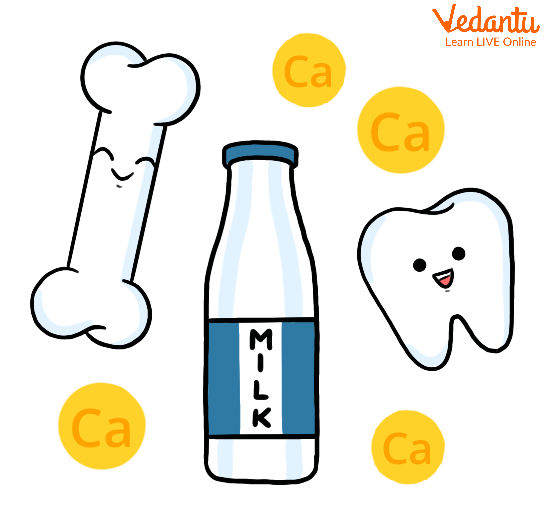




What is calcium?
Calcium is a mineral that helps bones grow and stay strong. It is good for the body in many other ways as well. Calcium is important for keeping nerves and muscles working. It also helps keep the heart in good shape. It's also found in nerve cells and the blood.
To represent chemical elements, scientists use symbols. Ca is the letter for calcium. In nature, calcium is never found on its own. It mixes with other things to make compounds that can be found worldwide.

Calcium Use in Daily Life
Calcium Element
In the periodic table, Ca stands for calcium, with the number 20 as its atomic number.
Calcium (Ca) is an essential element that keeps our bones strong and can hold weight.
The nervous system also uses calcium to help send impulses through our bodies.
Characteristics of Calcium
The following are the characteristics of calcium:

Calcium in the Diet
It is essential for keeping teeth and bones in good condition.
Calcium ions on the exterior of bones engage with calcium ions in body fluids. This allows electron transfer, which is essential for keeping the amount of calcium in the body and bones in proportion.
Calcium in the human blood is needed for many vital functions, such as blood clotting, nerve signalling, hormone signalling, and muscle function.
Calcium can be utilised as a reduction agent to get the metal out of the ore.
Calcium carbonate is applied to produce cement and cement paste.
Interesting Facts About Calcium
Here are some facts about calcium elements that will make one want to eat more.
With the right amount of calcium and vitamin D, growing kids and teens can gain a lot of bone density, and one can slow down bone loss as people get older.
People have said that a balanced diet full of antioxidants can help prevent cancer. However, research shows on calcium information that getting enough calcium may also help prevent colorectal, cervical, and breast cancers.
Getting enough calcium can help lower the risk of heart disease and high blood pressure. The heart is a muscle, and the nervous system controls the heart and the blood vessels. So one could have heart problems or high blood pressure if one does not get enough calcium.
Conclusion
Calcium is essential for well-being as a whole. Because calcium works with many nutrients like vitamin D, it is necessary to eat a well-balanced diet. Like any mineral or carbohydrate, one must keep track of how much calcium one eats to ensure one does not get too little or too much. One could have other health problems if one does not get enough calcium.
For example, when one is an adult, not getting enough calcium can make one more likely to get osteoporosis, which is when the bones become weak, have high porosity, and break easily.
FAQs on Facts About Calcium
1. Why does the body need calcium?
If bones do not deposit calcium, the body will utilise it elsewhere.
Bones may weaken and become brittle if this continues, leading to osteoporosis.
The calcium in the diet and the vitamin D in the system affect how much calcium the bones can absorb.
Sunlight is the primary source of vitamin D, which aids calcium absorption.
Fish and egg yolks contain tiny quantities. Many foods are vitamin D-fortified.
2. Is calcium beneficial to sleep?
Calcium is essential to sleep patterns, especially in the REM sleep phase.
It calms the body down and makes it easier to fall asleep.
Not getting enough calcium can make one restless and stay up at night.
Also, when excess calcium gets stuck in a joint, it can be excruciating.
3. Can calcium raise or lower blood pressure?
Hypertension is a severe health problem that makes one more likely to get heart disease and kidneys.
Several research studies have shown that people with normal cholesterol levels can lower their blood pressure by eating more calcium.
People with normal blood pressure, especially those whose calcium intake increases, have slightly lower blood pressure and cholesterol levels.





















